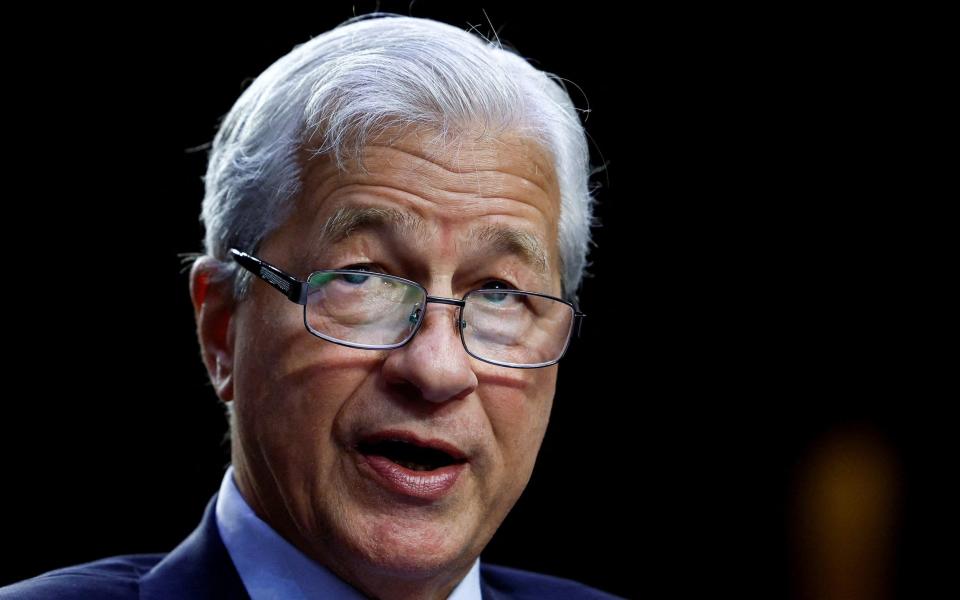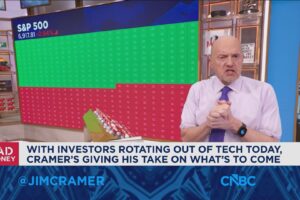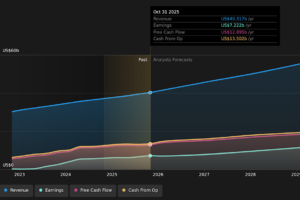
The British boss of Citigroup has warned that the US will fall into recession later this year amid a turbulent outlook for the financial sector.
Jane Fraser, chief executive of the Wall Street giant, told investors that the US will enter into a shallow recession after JP Morgan forecast “storm clouds” gathering in the wake of the recent banking crisis.
Jamie Dimon, chief executive of JP Morgan, issued the warning even as the lender was boosted by depositors pulling funds from smaller rivals.
He said: “The storm clouds that we have been monitoring for the past year remain on the horizon, and the banking industry turmoil adds to these risks.”
It came after the failure of Silicon Valley Bank (SVB) and the emergency rescue of Credit Suisse last month sent shockwaves through the global banking industry.
However, first quarter results reported by JP Morgan on Friday showed that the bank benefited from the crisis, with deposits jumping by $37bn (£29.7bn) during the period amid a flight to safety.
The unexpected rise in deposits, coupled with a strong performance in its consumer division, boosted JP Morgan’s profits by more than 50pc in the first quarter to $12.6bn.
Analysts at Oppenheimer said that JPMorgan “solidly trounced” its own guidance and investor expectations in the first quarter. Shares jumped by nearly 7pc in early trading in New York.
The sharp rise in deposits at the bank suggests that customers have flocked to JPMorgan amid concerns about the health of smaller regional banks in the US following SVB’s failure.
A number of regional lenders struggled to arrest a wave of customer withdrawals, forcing US authorities to intervene amid fears of contagion. Several Wall Street giants, including JP Morgan, also provided a $30bn lifeline to prop up California’s First Republic.
In his annual letter to investors earlier this month, Mr Dimon said: “While it is true that this bank crisis ‘benefited’ larger banks due to the inflow of deposits they received from smaller institutions, the notion that this meltdown was good for them in any way is absurd.”
Citigroup also earned more from borrowers paying higher interest on loans, as net income rose 7pc to $4.6bn for the three months to March 31, it reported on Friday.
The warnings come days after Andrew Bailey, the Governor of the Bank of England, played down the risks of a system-wide banking crisis.
Speaking in Washington earlier this week, Mr Bailey said issues had arisen in a “few parts” of the banking industry following the “necessary sharp tightening in monetary policy to bring down inflation from levels that are much too high”.
He added: “The post-crisis reforms to bank regulation have worked. Today I do not believe we face a systemic banking crisis. When I look at the UK banks, they are well capitalised, liquid and able to serve their customers and support the economy.”
Separately, Christine Lagarde, president of the European Central Bank (ECB), warned on Friday that there remains considerable uncertainty around how fast inflation will fall.
She said: “We expect euro area inflation to continue to fall, as lagged price pressures fade out and tighter monetary policy increasingly dampens demand. However, historically high wage growth, related to tight labour markets and compensation for high inflation, will support core inflation over the projection horizon, as it gradually returns to rates around our target.
Meanwhile, BlackRock, the world’s largest asset manager, said it was on the hunt for a “transformational” deal amid turbulence in the banking sector.
Larry Fink, chief executive of BlackRock, said: “If there is an opportunity to do something transformational, we are going to be prepared to do it. How can we double down on what we’re doing with… technology. How can we build out our footprint globally at this time?”
Read the latest updates below.
06:53 PM
Swiss National Bank can’t exclude raising borrowing costs again, says chairman
Switzerland’s central bank may need to increase interest rates further, as the country reels from the collapse of Credit Suisse.
“We can’t exclude that we might have to tighten monetary policy again,” chairman Thomas Jordan told reporters Friday in Washington, where he’s attending meetings of the International Monetary Fund and World Bank.
The Swiss National Bank increased borrowing costs by 50 basis points last month, taking its interest rate to 1.5pc
The SNB is expected to hike interest rates again when it meets again in June.
06:25 PM
IMF denies that UK growth forecasts are too gloomy
The International Monetary Fund has denied that its forecasts for the UK are too gloomy, after defending its pessimistic record since Brexit.
Economics editor Szu Ping Chan reports from Washington:
Alfred Kammer, head of the IMF’s European Department, said the UK’s growth pattern was “very similar” to the rest of Europe, despite its verdict that economic growth would be the weakest among big economies this year, including sanctions-hit Russia.
The IMF’s forecasts for the UK have consistently undershot official growth estimates since the Brexit vote in 2016. Telegraph analysis shows 25 out of 28 predictions about Britain’s economic growth were overly pessimistic.
Speaking at the IMF Spring Meetings in Washington, Mr Kammer blamed a disproportionate hit from high energy prices for the UK’s underperformance.
“The energy price shock is hitting the UK particularly hard because a large part of household budgets are spent on gas, and that lowers purchasing power and real incomes, and is an effect that is much more pronounced in the UK,” he said.
The IMF expects the UK economy is expected to shrink by 0.3pc this year. By comparison, Germany is expected to shrink by 0.1pc, the euro area expand by 0.8pc, while the US is expected to grow 1.6pc.
Mr Kammer also blamed the weaker outlook on rising interest rates and the UK’s shrinking workforce.
“That leads to a situation where the growth slowdown in the UK is larger than what we see in some neighbouring countries.”
Mr Kammer also defended the IMF’s record, saying it always made the “best effort” to get things right. “It’s very difficult during the last two years to be very accurate with forecasts [with the pandemic and Russia’s invasion of Ukraine],” he said.
Mr Kammer delivered a ringing endorsement of Jeremy Hunt’s plan to get debt down and get more people into work in the Budget. However he added that the Chancellor and others should “step up reforms to ensure medium term growth”.
06:19 PM
Chairman of Britain’s banknote printer quits in boardroom battle
The chairman of banknote printer De La Rue has resigned from his role amid a boardroom battle at the British Firm.
Kevin Loosemore, who had previously survived several shareholder attempts to unseat him, will leave the printing firm on May 1, the company said.
De La Rue added that the move would “draw a line under recent speculation surrounding the leadership of the company”.
The company, which designs banknotes for governments and central banks across the world, said it has launched a search for Loosemore’s replacement.
It comes weeks after De La Rue’s third-largest shareholder Crystal Amber had called for a general meeting to oust Loosemore.
The activist investor called for a shakeup at the struggling printer in a bid to revive its performance and share price.
Crystal Amber has nominated Pepyn Dinandt, currently an executive at German automotive supplier Eberspächer Group, to take up the chairman post. De La Rue confirmed that Mr Dinandt had “indicated his willingness to serve” and would be among the candidates for the role.
It comes as De La Rue has been struggling with lower profits and falling demand for currency.
Earlier this week, the firm said demand for cash has hit a 20-year low as people increasingly switch to cards and digital payments around the world.
Plummeting banknote usage has forced De La Rue, which also prints passports, to slash its sales forecasts and issue its third profit warning in a little over a year.
In November, it warned its profits would be lower than expected amid “material uncertainty that may cast significant doubt” on its future. It said that without winning key contracts or sufficient cost cuts, it would breach certain debt covenants.
Clive Vacher, De La Rue’s chief executive, told the BBC that banks increased orders for notes during the pandemic but were now delaying new purchases.
He said: “They always do that when there are crises, because of the security that having cash around them has.
“So we expected a downturn, which has indeed happened, but that downturn is probably extending deeper and probably for an extra nine to 12 months than we’d normally expect in the normal cycle of things.”
Shares in the company have lost roughly a third of their value so far this year.

06:11 PM
Britain’s six biggest supermarkets cut milk prices in battle for customers
Britain’s six biggest supermarkets have now all cut the price of milk this week as they battle to hang onto customers.
Retail editor Hannah Boland has the details:
Aldi, Lidl and Asda have become the latest supermarkets to cut the price of milk on Friday, with Morrisons promising to follow suit on Monday.
The supermarkets have all slashed the price of a pint by at least 5p in order to match Tesco, which fired the starting gun on a dairy price war earlier this week when it lowered the cost of a pint to 90p.
Tesco cut the price of milk on Wednesday for the first time in three years, undercutting Aldi and Lidl.
Sainsbury’s followed with its own cuts a day later, before Aldi, Lidl and Asda followed on Friday,
A spokesman for Morrisons said it would lower prices in stores from next week.
Supermarkets have quickly moved to match prices on the key staple in an effort to stop customers switching. The cost of living crisis has prompted levels of switching between grocers not seen in years.
Asda’s chief commercial officer Kris Comerford said: “We have invested to protect our customers throughout the cost of living crisis and have taken swift action to reduce the price of milk as commodity prices have eased.
Tesco had said it was able to take the step after wholesale prices started to come down.
Other products are expected to see price cuts in the coming months, with Ken Murphy, the boss of Tesco, this week hailing some signs of deflation at its suppliers. He suggested that the bakery aisle might be the next area where Tesco could start to bring prices lower, as the cost of ingredients such as oil and grains falls.
Mr Murphy said Tesco would be “very vigilant and very rigorous” to get a better price from its suppliers when it could see their costs going down. He said Britain’s biggest supermarket was the “most competitive we’ve ever been” on price.
It follows months of cash-strapped shoppers drifting to the German discounters, which have consistently been ranked as the cheapest in surveys by Which?. According to figures from Kantar, £62.8m of customer spend was switched from Tesco to Aldi in the 12 weeks to the end of March.
Mr Murphy this week said conditions “favour [the discounters] right now” as cost-of-living pressures weigh on household budgets.
However, he said that it was not inevitable that they would be able to steal more market share.

05:41 PM
Investor confidence after Wall Street bank results boost FTSE 100
Shares in London-listed banks surged today following the release of strong quarterly earnings reports from Wall Street banks.
Bank stocks across the FTSE 100 and FTSE 250 grew 2.57pc today.
Risers include NatWest (share price up 1.4pc), Barclays up (3.23pc) and Lloyds (up 1.12pc).
HSBC (share price up 0.11pc) reversed earlier gains after announcing that its planned sale of its French retail banking business could fail due to capital concerns on part of the buyer.
05:29 PM
National Grid among FTSE 100 fallers
The National Grid was among the FTSE 100’s top fallers after warning investors that the Government’s tax reform will impact future earnings.
The British utility company said that its earnings between 2024 and 2026 will be negatively impacted by the Government’s ‘full expensing’ tax relief initiative, although won’t have a major impact on cash flows.
The scheme announced in last month’s Budget allows companies to immediately deduct the cost of most investments in plant and machinery.
Its share price dropped 2.3pc to 1,117p.
05:06 PM
FTSE 100 climbs above 7,900 for the first time since SVB collapse
The FTSE 100 has finished the first week back from the Easter holidays in the green.
Earlier this afternoon the blue-chip index passed the 7,900 mark for the first time since the collapse of Silicon Valley Bank last month, recorded an intraday high of 7,904.04.
The index closed today’s session 0.36pc higher at 7,871.91.
FTSE 100 has grown 2.73pc this week, and 7.18pc over the past month.
The FTSE 250 mid-cap index ended 0.90pc higher at 19,242.69. The domestically focused index is up 3.45pc on the week, and 3.31pc on the month.
04:49 PM
Offshore workers vote on strike action against TotalEnergies in pay dispute
TotalEnergies faces potential disruption as offshore workers vote on whether to strike over pay, Unite have announced.
Around 70 union members based on offshore platforms in Elgin Franklin and North Alwyn, plus the mainland Shetland Gas Plant have until May 5 to decide whether to strike against the French energy company.
The dispute centres over pay and demands for a reduction in the number of days worked offshore.
Control room operators, mechanical, operations and production technicians, plus skilled engineers are among the balloted union members.
Sharon Graham, Unite general secretary, said:
Oil and gas companies in the offshore sector are enjoying record windfall profits. In 2022, TotalEnergies posted a record net profit of $20.5bn (£16.4bn). The scale of corporate greed in the offshore sector has to be challenged, and it will be by Unite.
It comes after Unite announced last week that nearly 1,400 offshore workers will strike later this month, threatening to bring the operations of several oil and gas companies to a standstill. The industrial action is set to impact BP, CNRI, EnQuest, Harbour Energy, Ithaca, Shell and Total.
04:29 PM
Twitter seeks to replicate Substack success with new paywall feature
Elon Musk will allow users of Twitter to put their tweets behind a paywall in the billionaire’s latest effort to shake up the social media site.
Senior business reporter James Warrington has the details:
Mr Musk said Twitter will let people charge for access to their content, “from longform text to hours-long video”.
The billionaire said the company will not keep any of the money users make from subscriptions for the first 12 months.
This means users will keep at least 70pc of their subscription revenues on mobile after accounting for app store fees, he said.
Twitter has been struggling in efforts to monetise its platforms after a 50pc slump in advertising since Mr Musk took over last year.
The company is also hoping to drive new revenue through its premium version, dubbed Twitter Blue, though only 1pc of monthly users have signed up so far.
Mr Musk has tried to replicate the success enjoyed by newsletter company Substack, which allows writers to earn revenues through subscriptions.
He is hoping to attract more content creators to the social media site in a bid to generate additional revenue in the future.
At the same time, Substack has tried to mimic Twitter through the launch of a Notes feature, which allows users to post on a public feed.
In response, Mr Musk temporarily disabled likes, replies and retweets if a tweet had a Substack link and hid news stories mentioning the company from search results.
Separately, Mr Musk has also inked a deal to allow users to trade stocks and cryptocurrencies on Twitter.
The social media firm has launched a partnership with eToro that will enable users to view market charts on an expanded range of financial instruments and buy and sell stocks and other assets, CNBC reported.
Twitter users can already see some real-time financial data on indices such as the S&P 500 and stocks including Tesla, using the platform’s so-called “cashtags” feature.
But the new partnership will extend the service, while users will also be able to click through to eToro’s site.
It marks a rare business deal for Twitter since Mr Musk’s troubled $44bn (£35bn) takeover of Twitter last year.

04:17 PM
Handing over
Alright, I’m off. Handing over to my colleague Adam Mawardi to see you through to the weekend.
03:49 PM
Bernard Arnault’s wealth jumps by $12bn in a day

Bernard Arnault, the world’s richest person, is pulling even further ahead of Elon Musk.
The French tycoon behind the luxury LVMH empire saw his fortune soar by $12bn yesterday to almost $210bn. That’s a record high and his second biggest single-day rise ever, according to the Bloomberg Billionaires Index.
Mr Musk gained $3.8bn, taking his worth to $180bn.
It comes after LVMH posted a strong rise in quarterly sales, with more people splashing out on brands such as Louis Vuitton and Christian Dior.
At the same time, Mr Musk’s Tesla has been forced to cut prices on its electric vehicles.
03:09 PM
ChatGPT can beat the stock market, professor claims
Artificial intelligence (AI) chatbots may be able to correctly predict the movement of stock prices by instantly analysing news headlines, research has claimed.
My colleague Matthew Field has more:
Experts from the University of Florida analysed the accuracy of ChatGPT, an AI algorithm, at guessing whether a news item would send the price of a share higher or lower.
The researchers found the bot was, in many cases, better at gauging whether a story might move the price than other “sentiment analysis” tools used by financial analysts.
The research, which has not been peer reviewed, compared ChatGPT’s answers about various headlines to real share price movements from historical data.
The bot, which has been developed by Silicon Valley start-up OpenAI, appeared to show “statistically significant predictive power on daily stock market returns”.
02:48 PM
City bosses accused of bonus ‘greenwashing’
City executives have been accused of greenwashing their bonuses by introducing sham renewable energy targets that are easy to hit, writes Simon Foy.
A report by PIRC, a shareholder advice company, found that large businesses are increasingly employing climate metrics in their pay schemes for executives – but the use of vague targets means that performance is not properly linked to earnings.
The report said that climate metrics for bosses are often bundled in as part of broader ethical investing targets, “making them of questionable value even if they were more challenging than is the case currently”.
It also warned that given the adoption of climate metrics that pay out too easily by boards, investors may become distracted by engaging over pay rather than focusing on transition plans and emissions reductions.
Conor Constable, stewardship manager at PIRC, said: “We question the view that a performance metric representing a fraction of the total opportunity available to executives is a credible tool to drive more desirable climate outputs. These metrics are neither easily measurable nor sensitive to the decision making of executives.
“If stakeholders are serious about holding decision makers accountable on issues such as climate change, it is necessary to pivot away from highly complex and opaque compensation structures to a renewed focus on the duties of directors and their legal obligation to be responsible for the impact of a company’s operations on the community and the environment.”
02:16 PM
Civil servants reject ‘insulting’ pay offer

Civil servants have rejected a government pay offer, raising the prospect of a further wave of strikes and dialling up the pressure on Rishi Sunak to resolve the dispute.
The Cabinet Office said government departments will be able to make average pay awards of 4.5pc, with additional flexibility to raise remuneration for the lowest-paid workers by 5pc.
But the PCS, which represents civil servants, issued a furious response over the below-inflation increase. The FDA, a second union representing managers, accused the government of shooting itself in the foot and threatened to ballot members over potential strike action.
PCS General Secretary Mark Serwotka said: “This insulting proposal will serve only to anger PCS members. We were given no opportunity to negotiate – it’s the most deplorable way to treat their own staff.”
More than 120,000 PCS members plan to strike on April 28, and the union is re-balloting its members to extend a mandate for industrial action beyond May.
Mr Serwotka said the government offer will “stiffen” the resolve of civil servants “and increase the likelihood of a new wave of sustained strike action.”
01:50 PM
US retail sales fall more than expected
US retail sales fell by more than expected in March as consumers cut back on purchases of cars and other big-ticket items, suggesting that the economy was losing steam at the end of the first quarter because of higher interest rates.
Retail sales dropped 1pc last month to $691.7bn, according to figures from the Commerce Department said on Friday. Data for February was revised up to show retail sales falling 0.2pc instead of 0.4pc as previously reported.
Retail sales are mostly goods, which are typically bought on credit, and are not adjusted for inflation. The second straight monthly decrease followed a sharp surge in January.
Economists said shifts in spending patterns at the end and start of the year as well as higher prices had made it harder to get a clear read of the data.
01:25 PM
Rail unions to be blocked from bringing country to a halt under pay deal

Militant rail strikers will be blocked from bringing the country to a halt under a new pay deal being considered by union chiefs.
Oliver Gill has the story:
New proposals put to the Rail, Maritime and Transport workers union (RMT) would see responsibility for industrial agreements devolved to local train operators and union branches.
The localised decision making means any future disputes would be held at a local rather than nationwide level, significantly reducing the possibility of a nationwide shutdown of the railways.
A series of national strikes has wreaked havoc over the last year in the worst campaign of industrial action since the privatisation of the railways in the 1990s under John Major.
Country wide strikes have hit the British economy and walkouts in other sectors continue to weigh on activity.
The new railway deal is being considered by the national executive of the RMT, raising fresh hopes of breaking the deadlock after a year-long dispute.
12:39 PM
Wells Fargo cashes in on interest rate rises
It’s also a positive set of results from Wells Fargo, which saw its profit jump 32pc in the first quarter as it earned more from interest rate payments.
The bank, however, set aside $1.2bn in the quarter to cover for potential loan losses, compared to a release of $787m a year earlier.
The provision included a $643m rise in the allowance for credit losses reflecting an increase for commercial real estate loans, primarily office loans, as well as an increase for credit card and auto loans, Wells Fargo said.
Banks are building up rainy day funds as fears of an economic slowdown mount from the US Federal Reserve’s aggressive interest rates hikes to tame inflation, as well as the recent turmoil in the banking sector.
12:25 PM
JP Morgan profit surges despite banking crisis
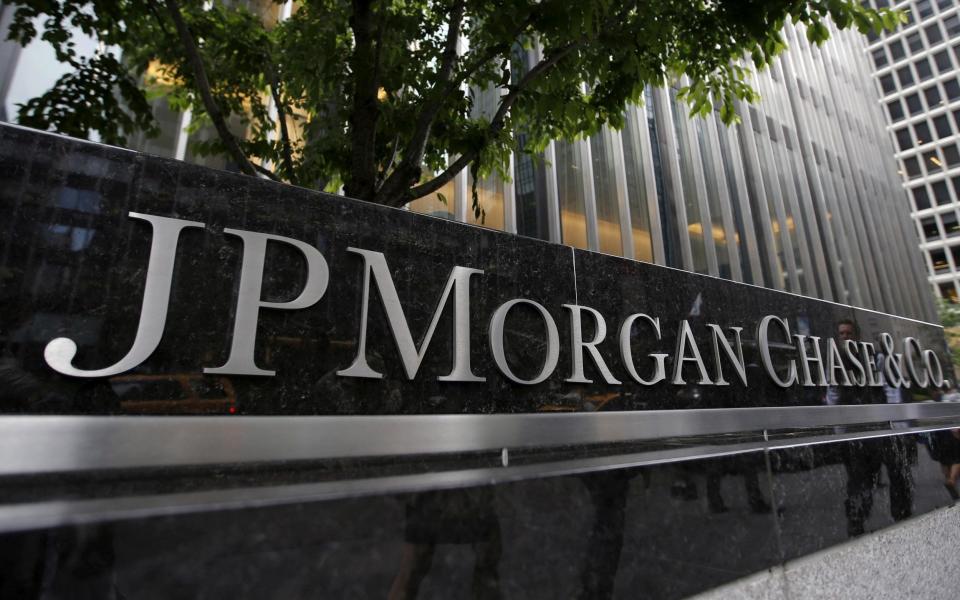
The chief executive of JP Morgan has warned of gathering “storm clouds” in the wake of the recent banking crisis, after the Wall Street giant was boosted by depositors pulling funds from smaller rivals.
Jamie Dimon said: “The storm clouds that we have been monitoring for the past year remain on the horizon, and the banking industry turmoil adds to these risks.”
It comes after the failure of Silicon Valley Bank (SVB) and the emergency rescue of Credit Suisse last month sent shockwaves through the global financial system.
However, JP Morgan benefited from the crisis, with deposits growing by $37bn (£29.7bn) during the first three months of the year amid a flight to safety.
The unexpected rise in deposits and a strong performance in its consumer division boosted the bank’s profits by 52pc in the first quarter to $12.6bn.
Analysts at Oppenheimer said that JP Morgan “solidly trounced” its own guidance and investor expectations in the first quarter. Shares in the bank were around 6pc higher in pre-market trading in New York.
12:08 PM
US futures slip ahead of bank results
Wall Street futures slipped this morning as investors await earnings from big US banks for signs of stress in the sector and the economy after the failure of two mid-sized lenders last month sparked concerns about a potential recession.
Shares of JPMorgan, Wells Fargo and Citigroup were muted in premarket trading ahead of their quarterly results.
The S&P 500 fell 0.2, while the Dow Jones and tech-heavy Nasdaq were both down 0.3pc.
Most Wall Street banks are likely to report lower quarterly earnings and face a dour outlook for the rest of the year, with last month’s regional banking crisis and a slowing economy expected to hurt profitability.
11:49 AM
Pound edges back from 10-month high
The pound has edged lower this morning but is still close to a 10-month high against the dollar, supported by improving appetite for risk ahead of a big week of data that could provide clues on the outlook for monetary policy.
The pound briefly hit its highest level since June 2022 at $1.254 earlier today before easing back. It was last down 0.1pc at $1.251.
“The catalyst is positive global risk sentiment and broad-based dollar weakness as markets position for a Fed pause,” said George Vessey, FX and macro strategist at Convera.
Inflation data released next Wednesday will be closely watched for clues on the outlook for monetary policy, while labour market data, retail sales and the flash PMI could also drive movement in the pound.
11:28 AM
Dr Martens cuts profit forecast amid warehouse woes

Bootmaker Dr Martens has seen its sales step up but cut its profit expectations after forking out to tackle problems at its Los Angeles warehouse.
The shoe brand downgraded its outlook after taking about a £15m hit from supply delays at the distribution centre.
It now expects to make about £245m in earnings this financial year, which ended on March 31, due to higher costs and lower wholesale revenue.
But the British business recorded a 10pc jump in revenues over the full year with particularly strong consumer sales in Europe, the Middle East and Africa.
Direct to consumer retail sales – those from its own stores – surged by more than a third in the fourth quarter of its financial year.
Yet sales in America have remained “soft” and wholesale revenue was down, which helped drag on total revenues.
The company was plagued by operational problems at its warehouse earlier this year, with stock building up after other US wholesalers used it to store some of their shipments.
10:58 AM
AO World raises profit forecast for fourth time
AO World has lifted its profit outlook again as it continued to benefit from recent cost-cutting efforts.
The online white goods retailer saw shares lift by more than a tenth in early trading after the fourth upgrade since last summer.
However, the recent improvements in outlook followed a sharp slump in its share price from the start of 2021 as pandemic-boosted growth slowed down.
AO said it has now witnessed “positive traction” from initiatives to reduce costs and improve margins which it launched last year to drive its turnaround.
The retailer added that worries over a negative effect from continued global economic uncertainty and the tough consumer backdrop “have not materialised to the extent envisaged”.
As a result, the group now expects to reach the top end of previous profit guidance, while revenues are due to have hit £1.1bn for the year to March.
10:31 AM
How video games became the greatest intelligence threat to the West

As tales of espionage go, the story of how 300 highly classified US intelligence documents were discovered being freely passed around on a chat app used by online gamers may appear wholly implausible.
Yet the leak, dubbed by some as the Pentagon Files, shines a spotlight on the real threat that the multi-billion pound online games industry poses to Western countries’ military and political security.
Gareth Corfield reports on how gaming poses a threat to our security. Read his story here.
10:05 AM
Germany expected to avoid recession
Germany is expected to narrowly escape recession and post modest growth in the first quarter of the year, according to an economy ministry report published today.
“A technical recession of two negative quarters in a row appears to have been averted,” the ministry said.
Current forecasts also predict a slight year-on-year increase in gross domestic product (GDP) for 2023 as a whole, it added. For 2023 as a whole, leading economic institutes expect the German economy to grow 0.3pc.
Economic indicators point to a noticeable pickup in value added in the first quarter, with industrial and construction output driving growth, benefiting from a further easing of material bottlenecks, significantly declining energy prices and favourable weather conditions, the report said.
“Consumer sentiment is expected to continue its recovery in the coming months, although inflation-related losses in purchasing power continue to weigh on the economy,” the report said.
09:31 AM
Britain’s heat pump rollout branded an ‘embarrassment’
Britain’s flagship heat pump scheme has been branded an “embarrassment” after badly missing its target of 30,000 annual installations and spending just 40pc of its budget.
Matt Oliver reports:
Fewer than 10,000 heat pumps were installed in the first year of the grant programme, which gives households money to pay for them as part of net zero efforts to wean Britain off gas.
Mike Foster, chief executive of the Energy and Utilities Alliance trade body, which represents boiler manufacturers, said: “It takes a certain type of genius to fail to give away £150m of taxpayers’ money and this wretched scheme looks like it has done just that.
“When will the Government actually listen to the people, the majority of whom simply cannot afford a heat pump, subsidised or not?
“The scheme is simply a taxpayer handout to those who don’t need it. It does little for carbon saving compared to investment on insulation. It does not help people keep bills low. It takes from the poor to give to the wealthy and it is an embarrassment of a policy.”
09:15 AM
Tesla to steer clear of Shanghai automotive show

Tesla will not occupy a booth at China’s largest annual automotive show, which is being held next week in Shanghai, according to plans published by the event’s organisers.
The financial hub is set to host Auto Shanghai between April 18-27. It is Asia’s largest auto show where brands from BYD to Volkswagen are expected to show off their latest models and technologies.
Tesla, which has a large electric vehicle factory in Shanghai, has attended the show in past years. The event was cancelled last year due to China’s Covid curbs.
In 2021, the company’s stage at the auto show made headlines when an unhappy customer clambered atop a Tesla being displayed to protest its handling of her complaints about malfunctioning brakes.
The incident led to fierce criticism of Tesla in state media and the company eventually issued a rare apology for not addressing customer complaints in a timely manner.
09:02 AM
Hermes sales jump on strong demand from China

Hermes has reported a jump in quarterly sales as the maker of the luxurious Kelly bag cashed in on strong demand from Chinese customers.
Revenue rose 23pc in the first quarter, outstripping analysts’ expectations. Shares rose 2pc in early trading in Paris.
Chief financial officer Eric du Halgouet said: “After a very good fourth quarter, we had robust traffic, even slightly higher in early 2023”.
The company said sales during the Chinese New Year were “very good.”
The strong first-quarter results come in the wake of a stellar fourth-quarter performance that was better than most of the company’s rivals.
Hermes has succeeded in growing sales in China at a time rivals such as Gucci were still suffering from Covid-related disruptions.
Hermes’ sales for Asia Pacific excluding Japan were up 22.5pc for the first three months. The luxury label, known for its silk carre scarves, also saw 19pc growth in the Americas, confounded concerns of a potential growth slowdown.
08:50 AM
FTSE risers and fallers
The FTSE 100 is on track for its fourth straight weekly gain, boosted pharmaceutical stocks and consumer staples.
The blue-chip index gained 0.2pc in early trading, while the domestically-focused FTSE 250 was up 0.8pc.
Healthcare stocks added 0.8pc, while consumer staples like British American Tobacco and Diageo pushed higher.
Dechra was by far the biggest rise as investors welcomed talks over a £4.6bn takeover by EQT.
Gains in copper prices helped industrial miners rise 0.4pc.
It’s looking less cheery for Superdry, though, which tumbled 16pc after the struggling fashion brand said a potential equity raise of up to 20pc was among funding options being considered.
08:37 AM
Dechra Pharmaceuticals surges on £4.6bn takeover talks
Veterinary pharmaceuticals giant Dechra is leading shares higher this morning after revealing it’s in talks over a potential £4.6bn takeover.
Dechra said it was in talks over a possible bid from Swedish private equity firm EQT in a deal backed by the Abu Dhabi Investment Authority.
Shares surged 37pc in early trading on the FTSE 250.
EQT now has until 5pm on May 11 to make a bid for the Cheshire-based company.
08:31 AM
RMT considers new pay offer
Rail union the RMT has said it’s considering a new pay offer, raising hopes of an end to disruptive strike action.
An RMT spokesperson said: “We have received an updated offer from the RDG and our NEC is considering its contents. No decision on any next steps has been taken.”
The union called off strikes planned for March 30 and April 1 amid a long-running dispute over pay, jobs and conditions for staff working across 14 rail operators.
Union members at Network Rail have voted to accept a revised pay offer in a similar dispute.
However, hundreds of cleaners working on trains across the country are walking out today and tomorrow.
08:24 AM
Gambling crackdown dents 888
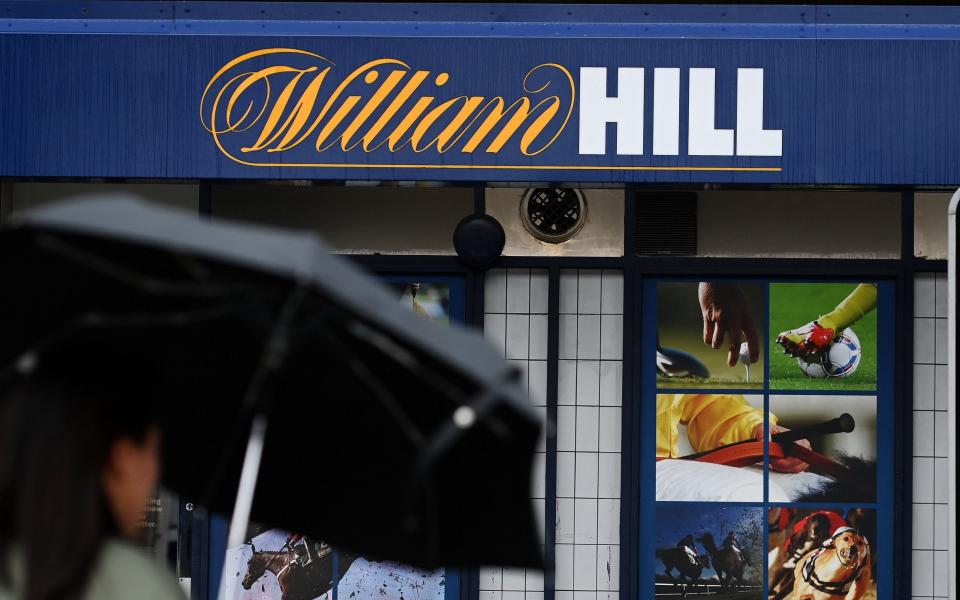
Around £1 in every £6 made by betting giant 888 online was wiped out last year amid a crackdown on problem gambling.
The company, which bought William Hill last year, reported a 3pc fall in total revenue to £1.9bn in 2022. Online revenue slumped 15pc, “driven by proactive investment in enhanced player safety measures” in the UK, as well as the closure of its business in the Netherlands.
However, the online hit was largely offset by improved performance in its retail shops. The deal to buy William Hill’s non-US operations included around 1,400 betting shops in Britain.
888 reported a £115.7m pre-tax loss due to one-off costs, including some of those linked to the nearly £2bn acquisition.
But when stripping out one-off charges, 888 said it had made an adjusted pre-tax profit of £80.5m, down 10pc compared to the year before due to increased interest costs that the business had taken on after buying William Hill.
In January, the company said that it had investigated shortfalls in how it treated Middle Eastern VIP customers. It expects to take a hit of around £25m to £30m to revenue this year as a result.
Executive chairman Lord Mendelsohn said:
The group’s financial performance in the period primarily reflected the extensive actions being taken to drive higher standards of player protection.
While recent compliance issues in the Middle East were very disappointing, they have underlined the importance of our enhanced and proactive risk management framework.
08:12 AM
Twitter to let users put up a paywall
Here’s the tweet from Elon Musk announcing Twitter’s new paywall option:
Apply to offer your followers subscriptions of any material, from longform text to hours long video!
Just tap on “Monetization” in settings.
— Elon Musk (@elonmusk) April 13, 2023
08:01 AM
FTSE 100 opens higher
The FTSE 100 has nudged higher at the open as markets look ahead to US retail sales and bank earnings.
The blue-chip index gained 0.2pc as markets opened to 7,858 points.
07:55 AM
YouGov taps former Meta executive as new boss
YouGov has appointed former Meta executive Steve Hatch as its new chief executive.
The London-listed polling company said Mr Hatch will take the top job at the start of August. It comes six months after the company said founder and chief executive Stephen Shakespeare will take up the role of non-executive chairman.
Mr Hatch has served as Meta’s head of northern European operations since 2016. Prior to this he spent 15 years at advertising giant WPP.
The leadership overhaul will also see Roger Parry step down as non-executive chairman, while Nick Prettejohn will take over as senior independent director.
Stephan Shakespeare said:
It is a pleasure to welcome Steve to YouGov. I am confident that I will be handing over the reins with YouGov in its strongest ever position and with a clear strategy to realising our vision of building the world’s leading marketing data and research platform.
It will be an honour to step into the role of Non-Executive Chair in August and continue my journey with the Company. I am hugely excited for what the future holds for YouGov.
07:47 AM
Superdry to cut £35m in costs as sales dry up
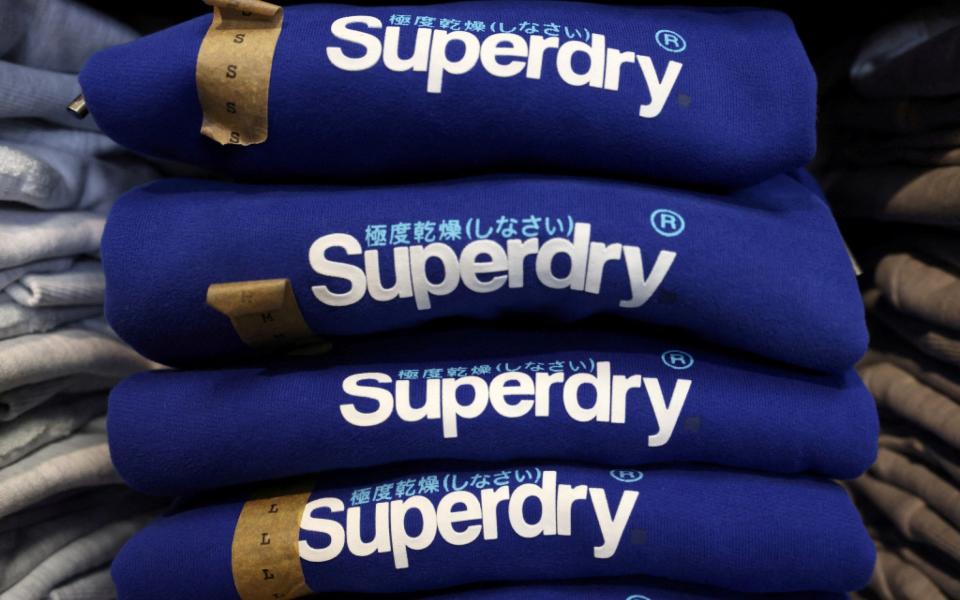
Fashion chain Superdry has unveiled plans to cut costs by more than £35m as it slashed its sales outlook on the back on weak consumer spending.
The retailer blamed issues “outside the company’s control” – including cost-of-living pressures and poor weather weakening demand for spring and summer collections – for a downturn in sales in February and March.
Superdry said it’s decided to withdraw its previous profit guidance, which stated it would broadly break even in the 2023 financial year.
The company said it plans to make the cost savings through “estate optimisation”, suggesting it will close stores. It also plans to reduce its clothing ranges.
Julian Dunkerton, Superdry’s founder and chief executive, said:
The Superdry brand continues to evolve but there is no doubt that the market conditions we face are challenging, compounded by the issues we have previously disclosed and are working to address in wholesale.
As a result, while we continue to deliver like-for-like growth in retail sales, we need to ensure our business is in the right shape to navigate these difficult times, which is why we are looking hard at our cost base.
My belief in the Superdry brand is stronger than ever which is why I’m prepared to provide material support to any equity raise undertaken.
I am confident that we have the right plan and, working together as a team, the business will emerge from the current turbulence stronger than ever.
07:37 AM
Elon Musk signs deal to let people trade stocks on Twitter
Elon Musk has inked a deal to allow users to trade stocks and cryptocurrencies on Twitter.
The social media firm has launched a partnership with eToro that will enable users to view market charts on an expanded range of financial instruments and buy and sell stocks and other assets, CNBC reported.
Twitter users can already see some real-time financial data on indices such as the S&P 500 and stocks including Tesla, using the platforms so-called “cashtags” feature.
But the new partnership will extend the service, while users will also be able to click through to eToro’s site.
It marks a rare business deal for Mr Musk since his troubled $44bn takeover of Twitter last year.
07:24 AM
Good morning
5 things to start your day
1) Britain’s heat pump rollout branded an ‘embarrassment’ | Flagship net zero scheme flops as installations fall far short of target
2) Pensioners should get better returns on their investment, Hunt warns | Britain’s diffuse and risk averse pensions industry may be holding back growth and stifling returns
3) EY’s UK chief warns of wave of resignations after split plan falls apart | Firm to shift focus toward addressing inefficiencies built up in advance of planned split
4) We will defeat strikers even if it means short-term pain, vows Hunt | Government prepares to face down pay demands to combat inflation
5) Holiday landlords fear fees of up to £1,000 a year under Gove’s ‘anti-business’ crackdown | Proposed changes draw criticism from former housing secretary and industry leaders
What happened overnight
Wall Street stocks advanced as new inflation data showed an unexpected reduction in producer prices and new claims for unemployment benefits, signalling a near-end to the Federal Reserve’s hawkish monetary stance.
The Dow Jones Industrial Average ended 1.1pc higher at 34,029.69, while the broad-based S&P 500 jumped 1.3pc to 4,146.22. The tech-heavy Nasdaq Composite surged 2.0pc to 12,166.27.
The rally came ahead of the release of earnings reports from large Wall Street banks on Friday, which are expected to face heavy scrutiny following the collapse of Silicon Valley Bank and other lenders last month.
Treasury yields fell immediately after Thursday’s weaker-than-expected inflation reports, but later reversed these losses. The yield on the benchmark 10-year Treasury rose to 3.44pc, while the rate-sensitive two-year Treasury held steady at 3.97pc.




